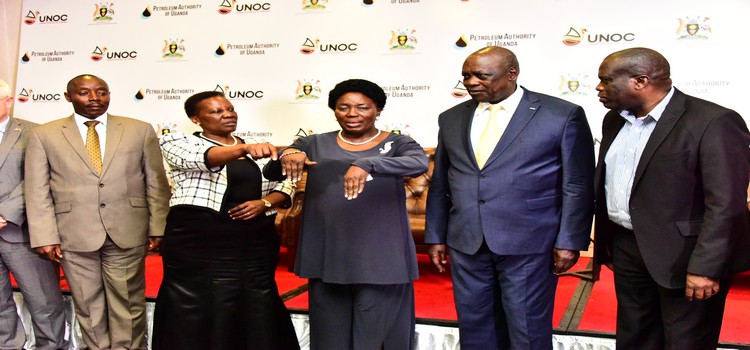Members of Parliament led by the Speaker, Rebecca Kadaga have questioned the extension of the first oil production from 2020 to 2022.
The legislators raised these concerns during a workshop organised by the Petroleum Authority of Uganda (PAU) and the Ministry of Energy and Mineral Development on the current developments in the oil and gas sector in Uganda on Friday, 01 February 2018 at the Lake Victoria Serena in Kigo.
Kadaga said that the first oil timelines has been extended for too long and this time it should be met.
“There has been an information gap concerning what has been happening in the oil and gas sector and the government has been moving the year for oil production commencement,” she said.
Hon. James Waluswaka (NRM, Bunyole West) wondered whether the intentions behind the extension of the date of first production were not deliberate.
“I am worried that this might be a deliberate effort by some stakeholders in the sector to politically disenfranchise the fountain of honour who has been promising us oil for some time now,” he said.
Nakasongola District Woman Representative, Hon Margaret Komuhangi demanded for the exact timelines of the establishment of the oil refinery in Hoima District.
“We have been hearing the expected dates of oil production but we will also want to know when the oil refinery will be operational because it is an important piece of infrastructure in this process,” she said.
The government however, came out to clarify on the extended timelines of oil production in the Albertine region.
The Permanent Secretary in the Ministry of Energy and Mineral Development, Robert Kasande said that oil exploration and production processes are determined by varying factors.
“We thought we would produce earlier when he had only found 300 million barrels but we found 1.4 billion barrels of recoverable oil forcing us back to the drawing board to plan for efficient production of the oil,” he said.
Kasande added that the country is also affected by being landlocked with no oil and gas infrastructure. he called for more substantial infrastructure for production, refining and transportation of the oil
“We had to involve Kenya and Tanzania who have promised to invest in the pipeline and these agreements took time as well,” Kasande added.
Mr Hans Christopher, from Norway’s NORAD explained that the revision of timelines for oil production has not only happened in Uganda. This, he said, gives the country time to plan better, and understand the technical nature of the oil fields before production.
However, the PAU Executive Director, Ernest Rubondo said that more emphasis should be put on the efficient execution of the processes supporting the oil production than the first oil timeline.
“The focus is ensuring that all necessary infrastructures are put in place to facilitate oil production, all stakeholders in other sectors are in involved in the petroleum development process and the interests of the government are protected,” Rubondo said.
This he added, is important because Ugandans must prepare to retain a significant portion of the US$20 billion investment required in to develop the facilities required to produce the oil.
Currently, there are two projects under the supervision of PAU called Tilenga and Kingfisher with the ability to produce 40,000 and 190,000 barrels of oil respectively. Tilenga is operated by Total E&P Uganda while Kingfisher is operated by CNOOC Uganda.
There is a planned construction of an oil refinery, Kabaale industrial park International Airport in Hoima District. A 1445 kilometre oil pipeline will be constructed from Hoima to Tanga in Tanzania to carry crude oil for exportation.
Government’s commercial interests in these projects are managed by the Uganda National Oil Company.

